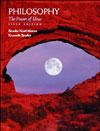 |  Philosophy: The Power of Ideas, 5/e Brooke Moore
Kenneth Bruder
The Rise of Modern Metaphysics and Epistemology
Key ObjectivesUpon completing this chapter you should be able to:
1.Distinguish dualism from materialism, idealism, and other alternative views. |
 |  |  | 2.Explain Descartes' doubting methodology and his "epistemological detour". |
 |  |  | 3.Explain Descartes' "clear and distinct" litmus test for truth. |
 |  |  | 4.Explain why Descartes believes there are two distinct substances and how he distinguishes between them. |
 |  |  | 5.Explain the problems facing dualism. |
 |  |  | 6.Describe Hobbes' materialism and his materialist psychology. |
 |  |  | 7.Explain the problems facing materialism. |
 |  |  | 8.Describe the alternative metaphysics of Conway and Spinoza and explain some of the important implications of each. |
 |  |  | 9.Describe Lockes's "representative realist" theory of perceptioin. |
 |  |  | 10.Explain Berkeley's objections to representative realism. |
 |  |  | 11.Describe Berkeley's reasons for rejecting matter. |
 |  |  | 12.Explain Berkeley's version of idealism. |
|



 2002 McGraw-Hill Higher Education
2002 McGraw-Hill Higher Education